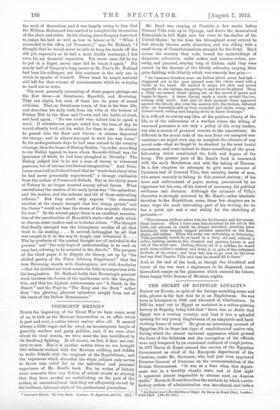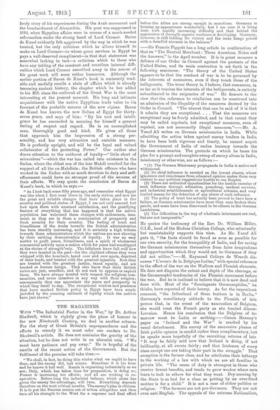THE SECRET OF EGYPTIAN LOYALTY.*
BARON DE KUSRL, in spite of his foreign-sounding name and title, glories in the fact that he is an Englishman. He was born in Liverpool in 1848 and educated at Cheltenham. In 1863 be went out to Egypt as assistant in a cotton-ginning factory at Zagazig, being told that "there was no doubt that Egypt was a coining country, and that it was a splendid opening for any young Englishman of an adaptable and hard- working frame of mind." He gives an interesting account of Egyptian life in those last days of unadulterated native rule, during which the almost universal oppression which ground the faces of the fellaheen and the corruption of the officials wore only tempered by an occasional outburst of rough justice. In 1877 Baron de Kusel entered the service of the Egyptian. Government as chief of the European department of the Customs, under Mr. Scrivener, who had just been appointed Director-General of Customs on the recommendation of the British Government. " It was at a time when this depart- ment was in a terribly chaotic state, and at first sight it appeared almost impossible to cleanse such an Augean stable." Baron de Kusel describes the methods by which a satis- factory system of administration was introduced, and tells a An .BtlyBe7=rnan's BecoBections o/ Egypt. By Baron do liusOl (Boy). London TolinLkno.' [1.08:(3d. not.]
lively story of his experiences during the Arab movement and the bombardment of Alexandria. His post was suppressed in 188t, when Egyptian affairs were in course of a much-needed reformation under the strong hand of Lord Cromer. Baron de Kusel evidently felt aggrieved by the way in which he was treated, but the only criticism which he allows himself to make on Lord Cromer—to whose great services in Egypt he
pays a well-deserved compliment—is that that statesman was somewhat lacking in tact—a criticism which to those who have any inkling of the constant and countless internal diffi-
culties which Lord Cromer smoothed away in the course of his great work will seem rather humorous. Although the earlier portion of Baron de Kusel's book is eminently read- able and usefully recalls a state of affairs which is already becoming ancient history, the chapter which be has added to his MS. since the outbreak of the Great War is the most interesting at the present moment. His long and intimate acquaintance with the native Egyptians lends value to his forecast of the probable success of the new r4ginte. Baron de Kneel has known the new Sultan of Egypt for thirty- seven years, and says of him : " By his tact and intelli- gence be has succeeded in securing for himself a general feeling of respect and regard. He is an accomplished man, thoroughly good and kind. He gives all those that approach him the impression of a strong per- sonality, and has very attractive and amiable manners. He is perfectly upright, and will be the loyal and valued collaborator of the protecting Power." Our author also draws attention to the outburst of loyalty—" little short of miraculous "—which the war has called into existence in the Sudan, where the eldest son of the late Mahal vouched for the support of all the ex-Mandists : the British officers who have worked in the Sudan with so much devotion to duty and self- effucement could have no stronger proof of the success of their efforts. We may quote the conclusion of Baron de Kusel's book, in which he says ;—
" As I look back some fifty years ago, and remember what Egypt was like when I first went there in the early sixties, and now see the great and notable changes that have taken place in the country and political status of Egypt, I am not only amazed, but look upon them with unmixed satisfaction, and the gratifying feature of everything that has happened is that the native population has welcomed these changes with enthusiasm, inas- much as they see in them a continuation of prosperity and fresh security for their country. The feeling of trust and friendliness of the Arabs towards the British administration has been steadily increasing, and it is certainly a high tribute towards these administrators which the natives are now showing by their striking demonstration of loyalty. It was no easy matter to graft peace, friendliness, and a spirit of wholesome commercial activity upon a nation which for years had worshipped at the shrine of strengtleonly. The fellaheen know full well how they were treated in the past—for the slightest offence they were whipped with the kourbash, taxed over and over again, deprived of their lands, and treated with the greatest injustice. Now they are treated with the greatest justice, taxed equally, and are treated as human beings. They also know that their British rulers are just, unselfish, and do not seek to oppress or exploit them. We have always treated with respect the religious com- munities, and never interfere in any way with their religion; consequently they can appreciate the peace and prosperity in which they dwell to-day. The exceptional wisdom and prudence that have marked British policy in Egypt have been amply justified by the amazing outburst of loyalty which the natives have just shown."



































 Previous page
Previous page